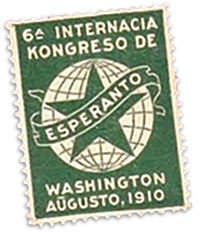
The 6th World Congress of Esperanto, held in Washington D.C. in August 1910, had reached its peak with an address by the language’s creator, Ludwig Zamenhof, on August 15th. Entitled “Lando de Libereco,” Zamenhof complimented the United States for being a land without tribe or church, a place of freedom and cooperation. A full English translation is here. Zamenhof and about 300 of his fellow Esperantists had come to the U.S. in hopes of reaching the ‘melting pot’ of American society, which in many ways resembled the construction of Esperanto. As such, 1910 was one of the ‘peaks’ in Esperanto interest in the U.S., reaching as far as North Dakota that year.
Zamenhof’s address describes the U.S. as a world power several years before WWI proved it, and his hope that America could help provide a foothold in making an international language was in the right place but unsuccessful. Much the opposite happened: the combination of the 19th century British Empire and the U.S.’ world domination in the 20th century only further established English as the lingua franca for international correspondence.
Zamenhof’s interest in leveling the world language playing field got him nominated for the Nobel Peace Prize numerous times, and he reached serious contention also in 1910, losing out to the International Peace Bureau. Probably a good sign, Hitler described Esperanto in Mein Kampf as yet another of the ways the Jewish people (Zamnehof was Jewish) were setting themselves up for world domination, and the Nazi expansion further prosecuted Esperanto speakers. Those World Wars also disrupted the schedule of Esperanto World Congresses, and further weakened the spread of Esperanto. It received a bit of resurgence in the 1960s and 1970s, with the world-positive hippie movement and the infamous Shatner movie Incubus.
http://www.youtube.com/watch?v=fPOLfbidOFA
Despite the fading non-academic interest in Esperanto in the U.S., the United States branch of the language is still doing its best to spread the good word, but it finds itself awash in a flood of other constructed languages. Esperanto is the honorable great-grandfather of the modern Conlang community, a group of people who have been developing and spreading their own manufactured languages. While the Esperantists of the early 20th century had to spread printed text and schedule their conventions around the world, the internet has created a means for new languages to disperse around the world without the same limitations Esperanto experienced. In a sense, now Esperanto is but one drop in a pool of creative and innovative manufactured languages — practically the opposite of Zamenhof’s intentions. The Late Rev. Glen Proechel was a fluent Esperantist who dabbled in Klingon — in the early nineties Proechel worked on the Klingon Bible translation, wrote primers on speaking Klingon, and ran a Klingon Language Camp in Red Lake Falls, MN (see a sample newsletter here), further blurring the line between what constitutes a “real” language. The Klingon camp may not be operating any longer, but the World Congress of Esperanto is still running, and in 2014 will be held in Buenos Aires Argentina.